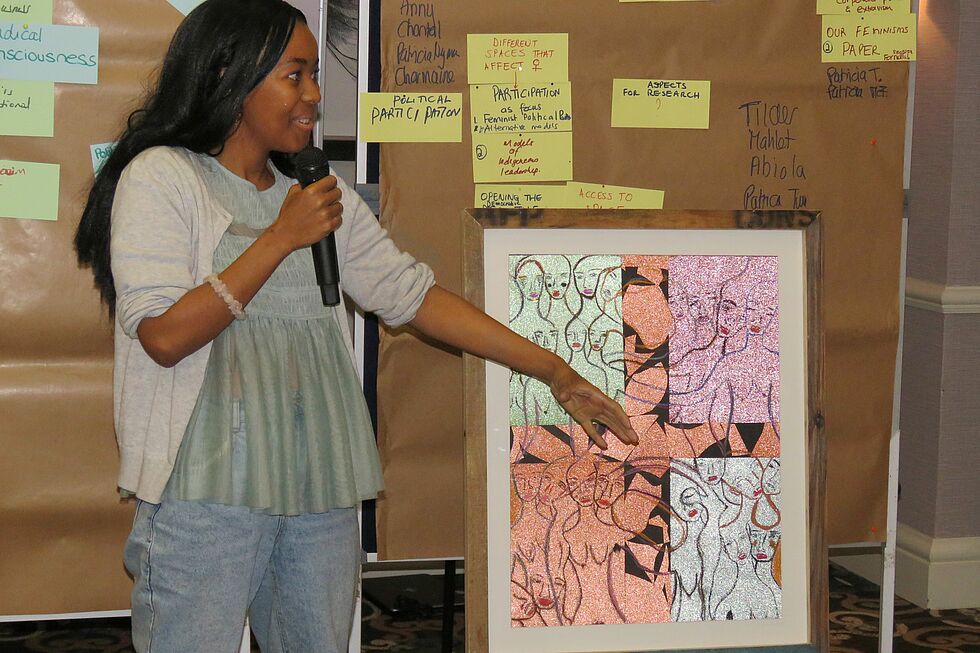"With more women, politics will be seen as a space for people, rather than men"
"With more women present, politics will no longer be seen as a space for men but rather for people", says Maria Alesi, project assistant at Friedrich-Ebert-Stiftung (FES) in Uganda for almost two years now, where she supports programmes on feminism and community policing.
Gender-based affirmative action in politics as an approach to win space for female representation in politics and its implications for young women leaders was the subject of a workshop held in Kampala by Friedrich-Ebert-Stiftung (FES), the Public Policy Institute (link) and the Westminster Foundation for Democracy (link).
We asked Maria Alesi, who helped organize the workshop, about the affirmative action as approach in the country and how this can be achieved in Uganda. Alesi sees the work on topics concerning gender and feminism as an extension of herself: “I am a feminist. I have been female for a long time now. It would be stupid not to be on my own side,” she stated as we began our conversation, borrowing the words by an acclaimed American poet and civil right activist Maya Angelou.
Can you tell us what gender-based affirmative action in politics envisages?
Gender-based affirmative action in Ugandan politics provides for quotas in representation in parliament and at local government level for women. The Ugandan Constitution provides for each district to have a woman representative and 1/3 of the representation at all local government levels to be for women. It envisages equal representation of women and men in the different elective political offices.
Which challenges do women in Uganda face that make them push for affirmative action? How can getting women into regular constituency seats pose an opportunity to address them?
Being a predominantly patriarchal society, women in Uganda are subjected to social conditioning that presents them as subordinate to men. This structure of society places women at a disadvantage in the political, social and economic spheres of the country.
Family investment in the education of boys is usually given preference over the education of girls. Teenage girls are more likely to drop out of school because of menstruation interruptions and teenage pregnancy while their male counterparts complete their education. Understanding the vital role of education in breaking both physical and cognitive barriers for women in society, the failure to acquire an education impedes women’s participation in politics both at local and national level.
"The result of the burden of unpaid care work is recurring time and income poverty among women."
Women still carry the burden of unpaid care work. Care work is still not recognised and valued within the economic conversations in Uganda. The burden of unpaid care work affects women in all spheres of their lives. For example, in education, girls will still carry the burden of ensuring domestic chores are done both before and after school while their male counterparts will be playing or resting. This affects the ability of girls to perform in school as a result of fatigue. In the presence of a sick relative, female members of the family are more likely to skip school or participation in income generating activities to attend to the relative. The result of the burden of unpaid care work is recurring time and income poverty among women. The effects of such poverty undermine women’s ability to participate at all social, economic and political levels.
The need for gender responsive public and social services also raises the need for affirmative action. Health, education, employment and information, among others, are less available for women.
"With more women in poverty and an economic scale tipped in favour of men, women in Uganda are more unlikely to compete with men or even in the gender-based affirmative action positions"
The presence of discriminatory laws and policies—the Succession Act, Marriage Act 1904, Divorce Act, provisions under the penal code on prostitution come to mind—as well as the absence of the will to change by a dominantly male legislative arm of government also lends purpose to affirmative action in Uganda.
Moreover, women have less ownership of property in the country, meaning they are less likely to reap the profits of investment and more likely to be poor. The cost of politics is high not only in terms of time and energy, but money as well. With more women in poverty and an economic scale tipped in favour of men, women in Uganda are more unlikely to compete with men or even in the gender-based affirmative action positions. However, the gender-based affirmative action positions provide a guarantee that women will be represented despite the costs of politics.
Getting women in regular constituency seats would likely increase the number of women in Parliament thereby increasing the attention and support critical to pass progressive legislation that protects women against injustices such as rape, marital rape, defilement, wife inheritance and the denial of the women’s right to land (link Paywall). The Marriage and Divorce bill of 2009 hit a snag when it faced resistance from the male legislators who sought to uphold patriarchal power. The bill sought to change the way divorce, sharing of marital property and cohabiting in Uganda is handled.
With more women in parliament, it would help to have a much-needed piece of legislation like the Marriage and Divorce bill passed.
Also, seeing as getting more women is politics is a sure way to fight sexism in politics, the participation of women for the regular constituency seats would go a long way to fighting political sexism in the long-run. With more women present, politics will no longer be seen as a space for men but rather for people.
What is gender-affirmative action in politics a response to in Uganda? How has the marginalization of women in politics been manifested? How does this phenomenon persist?
For more than 18 years after Uganda’s independence in 1962, out of the 193 Members of Parliament, only three were women. At that time, it became obvious that women were not only underrepresented but there were a range of forces that had prohibited women from participating in active elective politics. In an attempt to empower women and increase their participation and representation in elective politics, the 1995 Constitution of Uganda in Article 78(b) created special interest parliamentary positions reserved for women to provide a stepping stone for them to get into elective politics and mitigate their marginalization in politics. The Local Government Act in Section 10, which covers the composition of District Council, under sub section (e) provides for the women councillors who will form one third of the district councils.
Despite quotas for representation, the participation of women in politics outside the gender-based affirmative action positions has not significantly increased on a national but also local level since Uganda’s independence in 1962.
Although these quotas have ensured women’s representation within political spaces, the participation of women outside the gender-based affirmative action positions has not significantly increased. According the Parliament of Uganda, only 19 of the 154 female Members of Parliament are in direct constituency seats. The data would not be very different for the Local Government positions.
To this day, marginalization of women in politics has manifested itself in the unrealistic standards society creates for women in politics—standards that are lower than those set for men. For example, women in politics are usually expected to be married, social biases codify them as stubborn, unruly and unladylike. They have been subject to sexist remarks about their looks, how they dress and how they conduct themselves. In some cases, female politicians have been threatened with rape as a method of intimidation. The set-up of society has also deprived women of economic empowerment, which is much needed for women to participate in politics.
Which initiatives and organisations exist in Uganda today that promote affirmative action for women? How do they push this agenda forward? What instruments and strategies can be used to promote and support affirmative action for women in Uganda?
There are numerous initiatives by both government and non-government actors to improve affirmative action for women in Uganda. Legal and policy advocacy by women’s rights and human rights focused organizations. They have continuously tasked government ministries, departments and agencies to review and enact laws and policies to provide for equal rights and opportunities for women. They also do a lot of research, and draft policy briefs and press contributions on the same issues. Organizations like Uganda Women’s Network (link), Akina Mama Wa Afrika (link), the Centre for Women in Governance (link), and the Forum for Women in Democracy (link) also run women in leadership trainings and mentorship programmes for young women in politics.
The government through the Ministry of Gender, Labour and Social Development as well as the Equal Opportunities Commission ensures equity in terms of gender is mainstreamed in all aspects of government work. For example, in the budget process the Equal Opportunities Commission awards Gender and Equity certificates to ministries, departments and agencies. Without this certificate, the Ministry of Finance, Planning and Economic Development cannot accept the budget of those entities. This has gone a long way in ensuring gender-budgeting.
Last but not least, media profiling women in leadership and doing more investigative journalism on issues that directly affect women will certainly give higher visibility to the purpose and reasons behind the need for affirmative action. ###
Find out more about the work by FES in Uganda, visit the official country office website and follow FES Uganda on Facebook or Twitter.
About FES Connect
Connecting people, in the spirit of social democracy, we source and share content in English from the German and international network of the Friedrich-Ebert-Stiftung.


